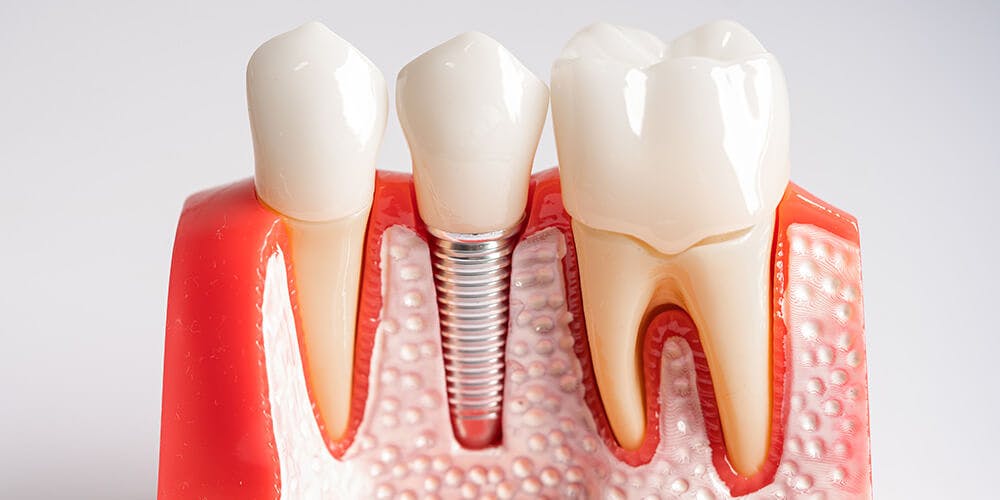Posted by Dr. Taner Cakmak on Mon, 22 Jan 2024
Kanata South Dental - Dentist Kanata

Dental implants are artificial tooth roots that are surgically implanted into the jawbone to support replacement teeth or bridges. They provide a strong and durable foundation for fixed or removable replacement teeth that mimic the appearance and function of natural teeth. Dental implants are considered a popular and effective solution for replacing missing teeth.
Key Components:
- Implant Fixture:
- The implant fixture is a small, screw-like post typically made of titanium, a biocompatible material. This fixture is surgically placed into the jawbone in the location of the missing tooth. Over time, the jawbone fuses with the implant in a process called osseointegration, providing a stable anchor for the replacement tooth.
- Abutment:
- The abutment is a connector piece that is attached to the implant fixture. It extends above the gum line and serves as a connection between the implant and the prosthetic tooth or teeth. The abutment can be made of metal, porcelain, or a combination of materials.
- Prosthetic Tooth or Teeth:
- The prosthetic tooth or teeth, also known as the crown or bridge, are custom-made to match the color, shape, and size of your natural teeth. These replacements are attached to the abutment, creating a natural-looking and functional tooth restoration.
Dental Implant Process:
- Consultation and Treatment Planning:
- The process begins with a thorough examination of the oral health and a discussion about the patient's dental history. X-rays or other imaging may be taken to assess the jawbone and surrounding structures.
- Implant Placement:
- The implant fixture is surgically placed into the jawbone during a minor surgical procedure. In some cases, a temporary crown may be attached to the implant during the healing period.
- Osseointegration:
- Over the next several weeks or months, osseointegration occurs as the jawbone fuses with the implant, providing a stable foundation.
- Abutment Placement:
- Once osseointegration is complete, a second, smaller surgical procedure is performed to attach the abutment to the implant. This step is necessary to allow for the proper positioning of the replacement tooth.
- Prosthetic Attachment:
- The prosthetic tooth or teeth (crown or bridge) are custom-made and attached to the abutment, completing the dental implant restoration.
Dental implants offer several advantages, including improved stability, functionality, and aesthetics compared to traditional tooth replacement options such as dentures or bridges. Additionally, they help preserve bone structure in the jaw and contribute to long-term oral health. The success of dental implants depends on factors like oral hygiene, overall health, and adherence to postoperative care instructions.
TYPE OF DENTAL IMPLANTS?
There are several types of dental implants, and the choice of implant type depends on various factors, including the patient's oral health, the location of the missing tooth or teeth, and the treatment plan determined by the dentist or oral surgeon. Here are some common types of dental implants:
- Endosteal Implants:
- Endosteal implants are the most common type of dental implants. They are surgically implanted directly into the jawbone. These implants typically resemble small screws, cylinders, or plates. Endosteal implants are suitable for patients with sufficient jawbone density and are used to support single crowns, bridges, or dentures.
- Subperiosteal Implants:
- Subperiosteal implants are placed on top of the jawbone but underneath the gum tissue. A metal framework is used to hold the implant in place, and prosthetic teeth are attached to posts that extend through the gums. Subperiosteal implants are an option for patients with insufficient natural jawbone for traditional implants.
- Zygomatic Implants:
- Zygomatic implants are a specialized type of implant that is longer than traditional implants and is anchored in the zygomatic bone (cheekbone) rather than the maxillary bone. Zygomatic implants are often used when there is significant bone loss in the upper jaw.
- All-on-4 and All-on-6 Implants:
- All-on-4 and All-on-6 refer to specific implant-supported prosthetic solutions for full arch (upper or lower) tooth replacement. In the All-on-4 approach, four implants are strategically placed to support a complete set of fixed teeth. Similarly, the All-on-6 approach involves the use of six implants for added stability.
- Mini Implants:
- Mini implants are smaller in diameter compared to standard implants. They are often used in situations where there is limited bone volume or for patients who may not be suitable candidates for traditional implants. Mini implants are commonly used to stabilize lower dentures.
- Immediate Load Implants:
- Also known as "same-day implants" or "Teeth in a Day," immediate load implants allow for the placement of a temporary restoration on the same day as implant surgery. This can be advantageous for patients who desire a quicker restoration of their missing teeth.
- Ceramic Implants:
- Traditional dental implants are typically made of titanium. However, some patients may have concerns about metal allergies or prefer a metal-free option. Ceramic or zirconia implants provide a metal-free alternative that is both biocompatible and aesthetically pleasing.
CONCLUSION:
The choice of dental implant type is determined through careful consideration of the patient's specific needs, oral health, and the recommendations of the dental professional.
If you need to start implant treatment and don’t know what is the first step, you can reach us and get an appointment with Dr. Taner CAKMAK. His expertise will explain to you where you can start and what is the best implant for you. You can reach out to 613-519-1400.
Dentist Kanata
We will gladly answer any questions you may have.
Ask QuestionsKanata South Dental offers the ability to request your dentist appointments online. Schedule an appointment now!
Book OnlineBy filling out the New Patient Forms ahead of time you will save significant time on your visit.
New Patient FormsLatest News
Key Benefits of Dental Cleaning
Fri, 9 Jan 2026Key Benefits of Dental Cleaning (And What Happens If You Skip Them) Regular dental cleanings play an important role in keeping yo...
Continue Reading